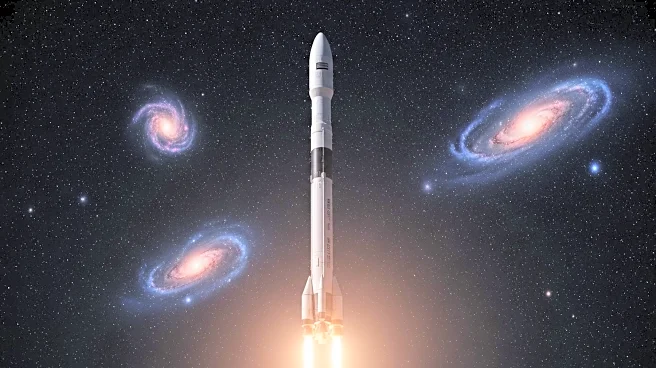What is the story about?
What's Happening?
SpaceX executed two Falcon 9 launches in a single day, deploying 56 Starlink satellites, marking its 130th launch of 2025. This rapid launch cadence underscores the competitive satellite megaconstellation race. Blue Origin also launched six passengers on its New Shepard rocket, marking its 15th crewed flight, as it prepares for a Mars mission later this year. Meanwhile, China plans a Long March 8A launch and is researching space debris removal technology, which has both safety and military implications. NASA and India's radar satellite has begun mapping Earth, showcasing successful international collaboration.
Why It's Important?
The intensifying space race highlights the growing competition among private companies and nations to establish dominance in satellite deployment and space exploration. SpaceX's rapid launch pace reflects the increasing demand for satellite internet services, while Blue Origin's space tourism flights indicate a burgeoning market for commercial space travel. China's advancements in debris removal technology could shift the balance of power in space, raising concerns about potential military applications. The collaboration between NASA and India demonstrates the benefits of international partnerships in advancing space technology and scientific research.
What's Next?
SpaceX plans to launch Amazon's Kuiper satellites, further intensifying the satellite internet race. Blue Origin's upcoming Mars mission will test its new heavy-lift rocket capabilities. China's focus on debris removal may lead to new international discussions on space sustainability and security. NASA's budget cuts could impact future space missions, prompting advocacy for stable funding. The Artemis Accords continue to gain international support, promoting peaceful exploration norms amid geopolitical tensions.
Beyond the Headlines
China's space debris removal efforts could have dual-use implications, potentially affecting global space security dynamics. The rapid pace of satellite launches raises concerns about orbital congestion and the need for international coordination to manage space traffic. The collaboration between NASA and India on radar satellite technology highlights the importance of shared scientific goals in fostering global cooperation.















